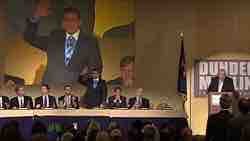Voting Rights
Common stock can also be referred to as a "voting share. " Common stock usually carries with it the right to vote on business entity matters, such as electing the board of directors, establishing corporate objectives and policy, and stock splits. However, common stock can be broken into voting and non-voting classes. While having superior rights to dividends and assets over common stock, generally preferred stock does not carry voting rights.
The matters that a stockholder gets to vote on vary from company to company. In many cases, the shareholder will be able to vote for members of a company board of directors and, in general, each share gets a vote as opposed to each shareholder. Therefore, a single investor who owns 300 shares will have more say in a voting matter than a single shareholder that owns 30.
Exercising Voting Rights
Many of the voting rights of a shareholder can be exercised at annual general body meetings of companies. An annual general meeting is a meeting that official bodies and associations involving the general public (including companies with shareholders) are often required by law (or the constitution, charter, by-laws, etc., governing the body) to hold. An AGM is held every year to elect the board of directors and inform their members of previous and future activities. It is an opportunity for the shareholders and partners to receive copies of the company's accounts, as well as reviewing fiscal information for the past year and asking any questions regarding the directions the business will take in the future. Shareholders also have the option to mail their votes in if they cannot attend the shareholder meetings. In 2007, the Securities and Exchange Commission voted to require all public companies to make their annual meeting materials available online. Shareholders with the right to vote will have numerous options in how to make their voice heard with regards to voting matters should they choose to.

Shareholder Meeting
This scene from "The Office" humorously illustrates a shareholder meeting, where the shareholder can exercise their right to vote on company issues or question company directors.